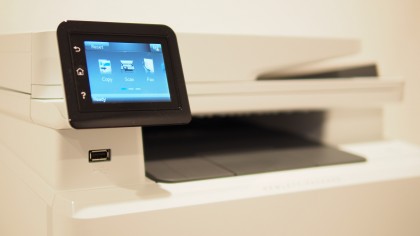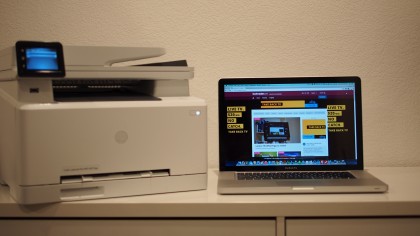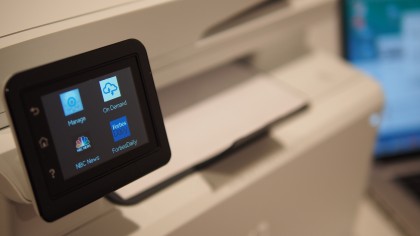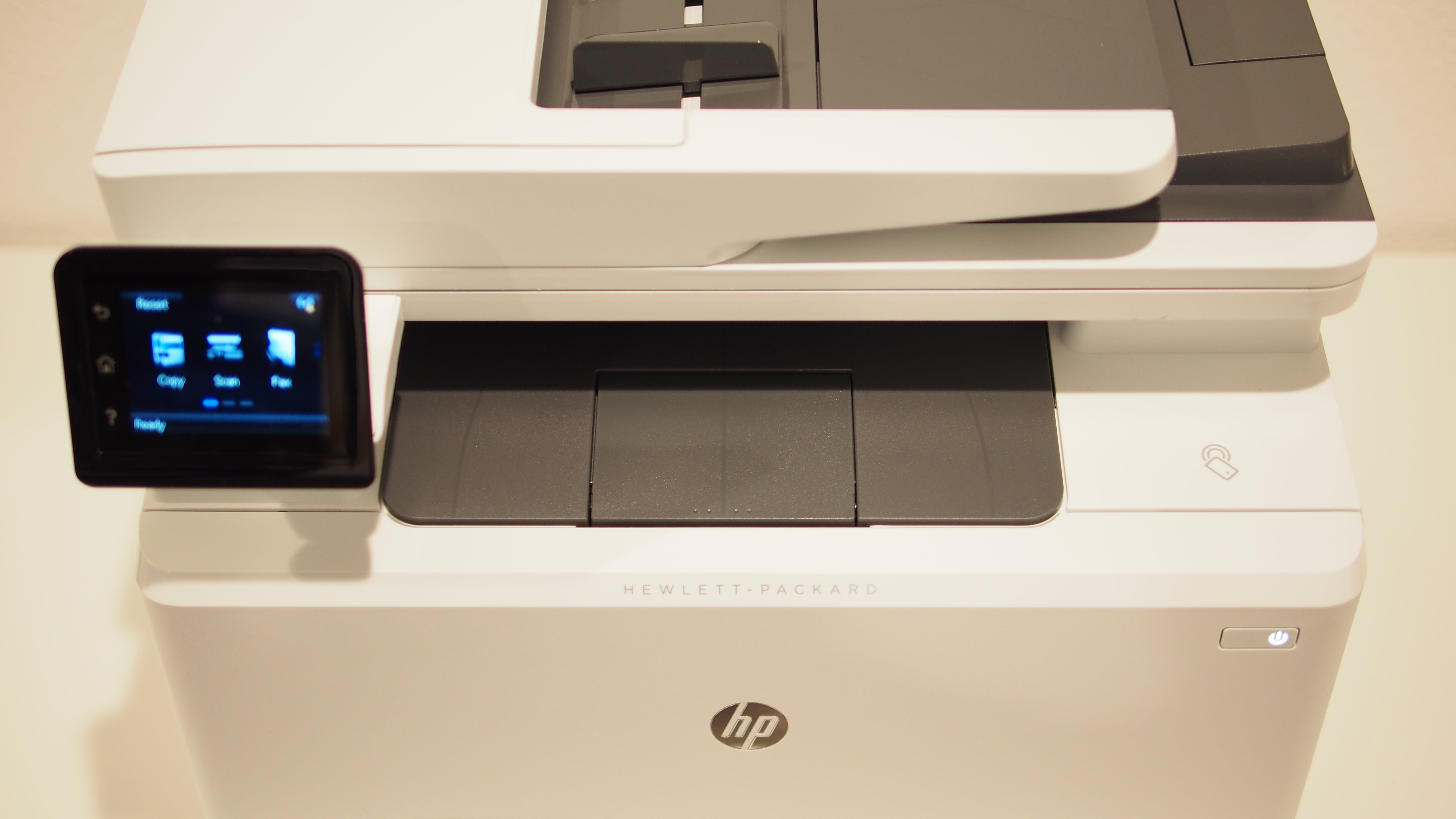Why you can trust TechRadar
HP claims that the new laser printing technology used inside the M277dw allows it to deliver up to 40% faster print speeds and 28% more prints per cartridge in a package that's 40% smaller while using 53% less energy.
HP advertises that the M277dw can print up to 19 pages-per-minute in either color or black-and-white. While the speeds are only about half as fast as HP's larger and much more expensive enterprise-class office printers, they match print speeds delivered by modern workgroup printers.

Printing a two-page PDF in color with fine text, it took about four seconds for the printer to warm up, and a total of twelve seconds for the first print to arrive. The total print time for two sheets took about 25 seconds from the moment I hit print on my Mac. With a standard five-page Word document with standard text size and minimum formatting, it took about thirty seconds for the total job. In general, I averaged between 12 and 18 pages-per-minute with simple documents.
Overall print quality is great, but lack the sharpness that an inkjet printer produces. Even though text quality is good for all but the smallest of font sizes, I notice slight pixelation and jagged edges around each letter.
Printing PowerPoint decks with heavy graphics, I found the quality to be about average, with colors appearing slightly darker than normal. There is also some graininess to the print, but fortunately with large patches of colors I didn't notice any posterization, or color banding.
For enterprise users who work with confidential documents, HP's JetAdvantage Private Print technology will hold your print jobs in a cloud queue until you're at the printer and can authenticate with a PIN, or a smart card on a larger office MFP. In addition to privacy, JetAdvantage Private Print also prevents your print jobs from sitting on the output tray, potentially getting mingled or lost in a colleague's finished print job.

An upgrade from the LaserJet Pro 200 MFP M276nw is the support for automatic duplex printing on the M277dw. On last year's model, duplex printing required manual intervention. HP claims that print speeds have improved on this year's model by 26%, and users can squeeze out 28% more pages out of the standard and high capacity cartridges.
As HP didn't provide photo paper for laser printer, I did not test photo printing using the M277dw. Because laser printers generate heat to print, photo paper designed for inkjets would not work with a laser printer, and the paper's coating may melt going through the M277dw.
I found photos that are part of a PDF marketing brochure and PowerPoint presentation that I had printed appear good on standard office paper, but lacked the sharpness and vividness produced by an inkjet printer that may be required for discerning photographers.
Unfortunately, even though the M277dw can handle duplex, or double-sided, printing, the automatic document feeder only allows for one-sided scanning and copying. With copying, the automatic document feeder can make single-sided to single-sided copies or single-sided to double-sided copies. You can't do double-sided to double-sided or double-sided to single-sided copies with the M277dw, which is an unfortunate limitation given that this printer is marketed to business users.
The upside to the scanner is that it can handle resolutions up to 1,200 x 1,200 dpi while the copier can handle resolutions up to 300 x 420 dpi. The M277dw has a scan speed of 21 pages-per-minute for black-and-white and 14 pages-per-minute for color. Like printing, copying speed is 19 pages-per-minute for both black-and-white and color jobs.
If you're opting to use the flatbed for scanning and copying instead of the automatic document feeder, HP made a great design decision to remove the edges on the scanner bed. This reduces the time it takes to remove paper for scanning as you can slide off the sheets when you're done instead of trying to lift the sheets up.
There are plenty of options for printing and scanning using the M277dw. Users can print on the network, send a job to the printer via an email, or print remotely off the network using HP ePrint. Mobile users can use AirPrint on iOS or download HP's mobile print app on Android. Additionally, ePrint is also supported, allowing you to print from configured email and cloud accounts from your smartphone or tablet.

Even though the initial setup process of the M277dw is straightforward, I found the more advanced remote scanning capabilities clunky on the Mac. For instance, even scanning while on the network required a rather complicated setup process compared to the Epson WorkForce Pro WF-4630. HP's scanning feature allows you to scan and send files to a shared network drive, rather than to a computer on the network itself like on the Epson, but requires a bit more technical know-how to setup.
Scanning to a Windows PC on the same network as the M277dw is simpler to accomplish than on the Mac, as HP's driver and installation wizard installed the appropriate scanning software.
Similarly, for remote scanning, I wasn't able to simply configure an email address for the printer to deliver my scans; I had to enter in ports and SMTP settings.
Although the M277dw offers more flexibility for larger workgroups, busy executives may not want to dig around and manually configure these settings themselves. Because of the more involved setup process for advanced features, it feels like the M277dw should be configured by an IT department rather than an average personal user.
For those who still live in the paper world, HP also includes a number of apps that allow you to print content straight from the printer. For example, news apps such as NBC News and Forbes Daily allow you to print news and financial information on demand or at a scheduled time each day. It's like having the paperboy deliver a fresh copy of the paper each day.
